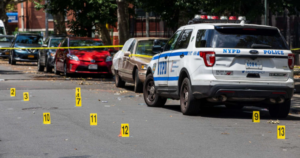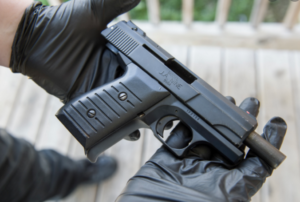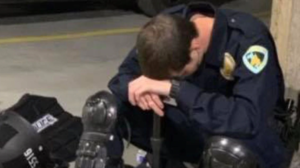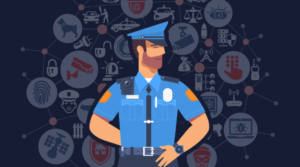The Ferguson Effect: a proposed concept that increased scrutiny of the police has led to an increase of crime in the United States as a result of less vigorous enforcement. Does it really exist? Is it a myth? Are there simply coincidences that were inevitable?
There are many law enforcement leaders, including the Director of the FBI, James Comey, who claim the Ferguson effect is real. There are others who claim it’s simply not true; interestingly enough the disparity is split down party lines. A recent study released by the Major Cities Chiefs Association (MCAA) demonstrates a significant uptick in violent crime in the largest cities in the US, which, when combined with what the police officers on the street are saying, lends itself to the fact this issue is real. So, the question is: What do we as a society do and what fills that gap? Because, law abiding citizens need to be safe, plain and simple. Maybe not so simple, which is discouraging, when you consider the massive effort put forth in policing for the last 25 years.
It all started in Ferguson, Missouri, in 2014. Darren Wilson, a police officer with the Ferguson Police Department was attacked by a previously convicted felon by the name of Michael Brown, immediately after Brown elevated a petty larceny to a robbery by exerting force over a convenience store owner. Wilson, in performance of his sworn duties, investigated Brown and a struggle for life ensued. Wilson was able to neutralize the assault, but in the process, Brown lost his life. As a former police officer, I have an opinion, but because I was not there, nor did I review the case, I will stick to the facts as reported by the Department of Justice (DOJ). Early indications, as reported by the media were that Brown had his hands up and was surrendering at the time he was shot. A DOJ investigation found this not be true. The table was set and some were not willing to clear it off.
A series of other arrest-related deaths sparked an outrage across the country. The thought was that African-Americans were being slaughtered by police because of their skin color. Each case was investigated, and in those cases findings were either justified, no wrong doing was found, or actual criminal charges were levied after thorough investigations. That’s how our criminal justice system works. Or at least, how it is supposed to work.
Facts Versus the Court of Public Opinion
Facts need to be acquired before a rush to judgement. One of the most sacred principles in the American criminal justice system, holding that a defendant is innocent until proven guilty. In other words, the prosecution must prove, beyond a reasonable doubt, each essential element of the crime charged. Is the court of public opinion turning that over? Sadly, that may have been the case in Baltimore in the Freddy Gray case. The court of public opinion actually prompted the District Attorney to levy charges against 6 police officers. With 3 acquittals and charges dropped on the other 3, it’s obvious the prosecution “jumped” to a conclusion.
Regardless, with the result of the perceived imbalance of treatment, a police officer should expect every street confrontation is not only being videotaped, but is being videotaped by numerous people. Some are even trying to instigate the police while filming. Unfortunately, so much occurs before the cameras come out; so much occurs outside of the view of the lens.
I can only imagine what it’s like to police with so many eyes on you. I never had to experience it myself, having retired in 2006. But, I do know police officers are true professionals and are adaptable. Has this effort to question every action by a police officer gone too far? Especially when the people who are criticizing the loudest have never donned a uniform and patrolled the streets.
Officers Feel Under Siege
“Nobody says it on the record, nobody says it in public, but police and elected officials are quietly saying it to themselves,” FBI Director Comey said. He went on, officers from one big-city precinct told him, “We feel like we’re under siege, and we don’t feel much like getting out of our cars.” The Ferguson Effect?
FBI Director James Comey, amplified the argument twice in November of 2015, suggesting anti-police sentiment fueled by the killings of unarmed black men in places such as Ferguson has resulted in a crime spike. President Barack Obama pushed back against that idea, arguing the existence of a violent crime wave is not supported by statistics, even while acknowledging rates are up in some major cities.
Violent Crime on the Rise
A midyear violent crime survey released July 15, 2016, by the Major Cities Chiefs Association shows violent crime is on the rise so far this year in major cities across the US compared to 2015. The number of homicides, rapes, robberies, assaults and shootings that occurred in the same cities by this point are all up. There are 307 more homicides so far in 2016, according to data from 51 law enforcement agencies from the largest US cities. Are the two years since Ferguson and the uptick in the crime rate a coincidence? Were the 25 years of crime declines overdue for a correction?
My colleagues and I at Vigilant Solutions have incredibly strong and trusted relationships with our law enforcements partners mainly for two reasons:
- Because we demonstrate our commitment to their objectives to fight crime and keep them and their communities safe, and
- Because we have an overwhelmingly high percentage of former law enforcement officers on staff.
We are hearing that the proactive approaches that resulted in the sharp crime declines starting in 1991 are being pulled back by either policy restructuring, including Field Investigations and Stop and Question and (possibly) Frisk, or a reluctance to engage due to a lack of support by politicians in providing the benefit of doubt and rushing to judgement before the facts are in. Look at Darren Wilson. He did nothing wrong, yet he is no longer a police officer. Over and over, we are hearing sentiments like, “This is not what we signed up for. We want to lock up bad guys. We want to make a difference.” Either way, this is a bad place to be.
Some groups are calling for police reform as it relates to use of force. Statistically speaking law enforcement is incredibly restrained. According to a DOJ and Bureau of Justice Statistics (BJS) report released in 2011, 4813 arrest-related deaths were reported from 2003 to 2009, where an estimated 98 million arrests were processed, or .00004911% of arrests end up with someone dying in police custody. That’s right, 5 decimal points, that is not a typo. Of those, 2931 were ruled a homicide. As a reminder, not all homicides are criminal.
No Budget Is No Answer
So what happens now? I believe things will settle because good always prevails. People want to be safe, and there is a need for someone to stand between good and evil. A police Sgt. in a large west coast police department told me he disagrees with the fact that the Ferguson effect exists. He said, “Cops will figure it out.” I agree, cops will figure it out. So I thought about that. What would I do? How would I figure it out? I know if I were in their shoes today, I would seek out and lobby for tools that made me smarter and safer. “No budget” is no longer an acceptable answer. It’s no secret police agencies have been underfunded and technology has always been lagging, but now more than ever cops need the tools that will help them “figure it out.”
(Note: I intentionally chose not to raise the impact of the New York City, Dallas and Baton Rouge police ambush murders into this conversation. Although I do think those horrific events will further affect policing and crime nationwide, it is not the Ferguson effect, it is a byproduct of the Ferguson effect.)





